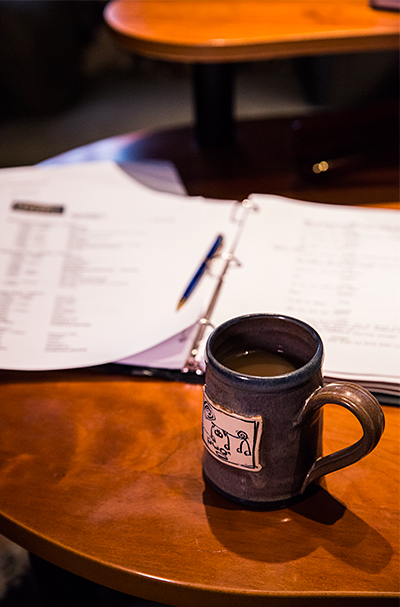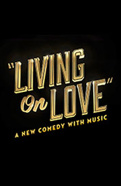Living on Love Playwright Joe DiPietro on How His Dog Turned Him into a Diva & Saying No to L.A.

Tony winner Joe DiPietro is known for writing the book and lyrics for the Tony-winning musical Memphis as well as All Shook Up, The Toxic Avenger, The Thing About Men, Falling for Eve, Over the River and Through the Woods, The Art of Murder and I Love You, You’re Perfect, Now Change, which is the longest-running revue in off-Broadway history. DiPietro’s latest project is Living on Love, a comedy based on Garson Kanin’s Peccadillo, starring opera goddess Renee Fleming. DiPietro invited Broadway.com into his tidy Upper West Side home to talk procrastination, pugs and how fear motivates him.
What’s the first thing you do when you sit down to write?
I generally have a plan of what I am specifically going to work on. I will take notes beforehand because the blank page is so terrifying that I have to have a plan of action. I can’t just sit down and think, “Oh, what do I feel like writing today?” Having said that, the first thing I do is I procrastinate as much as possible: I surf the web, I pace, I eat, I clean—then I write.
What essential items do you like to have on hand when you write?
I need caffeine and silence. Silence is big for me. I can’t write in public, and I can’t write with music playing. I need that zen space.

How do you stay motivated to finish a piece?
I have a fear of not finishing. Fear is a big motivator for me. I always try to write a first draft and not judge it. In my first draft, I want to get words down on paper that hopefully have a beginning, middle and end. Then I might change it completely, but it’s so much easier for me to rewrite than to write. There are always times when you hit a lull and lose faith in it, but I’ve learned to just write through it. It’s a bit of pigheadedness that gets me through.
Once you finish a draft, how do you celebrate?
I don’t really celebrate. I go on to the next thing. I generally have one or two other projects percolating in my head. If they’ve been percolating for a while, I’m generally anxious to get them out, but I won’t let myself write them until I finish what I’m working on. I’m not a real celebrator, I have to say.
What play changed your life?

Where did the title come from?
The title came from the original Garson Kanin play [Peccadillo]. I wanted to have something from it. Renee Fleming's character is having a fight with her husband and threatens to take all of his assets. He says, “What can I live on?” And she says, “You can always live on love.”
Was there a specific event that sparked your interest in Living on Love?
This show was a commission, and that’s unusual because usually you get commissioned to write musicals or TV and movie things. I got a call from Scott Landis, who was a producer of Nice Work If You Can Get It. He said, “Joe, we have this play by Garson Kanin about an opera diva. We gave it to Renee Fleming and she’s agreed to star in it and Kathleen Marshall is going to direct.” It intrigued me, but I was very busy. I said I'd do a little tweaking. Then I read it and thought it needed a lot more than tweaking. I told Scott if I had the freedom to really do my own thing on it, I would do it. To my shock, the Garson Kanin people said yes. I love this type of comedy: it’s a classic one-set, six-character comedy. It’s screwball; it’s boulevard comedy; it’s Neil Simon in a way—it’s got elements of all those things. To be able to write one of those in this day and age was just so attractive, especially with Kathleen and Renee.
Considering the subject of this play, what is the most diva-style demanding thing about you?
There are so many! I do oftentimes demand to take my pug Rocco with me to rehearsals and sometimes that doesn’t bode well.

What’s the nitty gritty hard work of being a writer that nobody told you about?
It’s lonely. That’s the hardest thing of it. What I love about theater is that I get to be lonely and alone for long periods of time, and then, if I’m fortunate enough to get the play produced, it’s incredibly social. Mostly you sit alone with your thoughts day after day. There are some days where I’ll not see anyone else besides the guy at the deli.
What’s the best piece of advice you ever received about writing?
Don’t go to L.A. I received that advice—which is not for everyone—from Jamie Hammerstein, who was Oscar Hammerstein’s son and my mentor. He produced I Love You You’re Perfect Now Change. Early on he said to me, “Don’t go to L.A. It’s hard, but you can write for theater if you stay here and really work at it.” I listened and it worked out.
Name a playwright that influenced you.

What is something you think all aspiring playwrights should do?
I think any aspiring playwright should be a lifelong student of theater and literature and humanity and history and politics. If I have any key to any success I’ve had, it’s that I’m constantly trying to learn new things. For instance [before Living on Love], I’d seen three or four operas in my life. So when this project came to me, I dove into that world to see what it was like, and I really enjoyed learning about it. I also think writers should have their own opinions. See shows that everyone loves that you don’t like and know why. See shows that no one likes but you really love. Having your own opinion is a way to develop a voice.
What's your favorite line from Living on Love?

